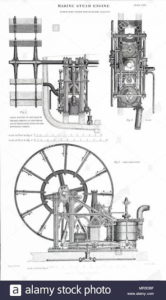
Bradley Invention
*Benjamin Bradley's birth is celebrated on this date in 1836. He was a Black engineer and inventor.
Bradley's correct surname was Boardley, but authors have written about him with Bradley since 1859. He was born a slave in Anne Arundel County, Maryland, in March 1836. He became literate while learning from his master's children. According to the Maryland State Manumission records, Bradley's owner was John T. Hammond.
As a teenager, Bradley worked at a printing office. By age 16, he had shown ingenuity and mechanical skills when he built a steam engine out of a gun barrel, pewter, round steel, and other materials. His master was impressed and could get him a job as a helper in the Department of Natural and Experimental Philosophy at the Naval Academy at Annapolis.
The money he had made went to his master at the Naval Academy, who allowed Bradley to keep five dollars a month for himself. As a helper at the Academy, Bradley helped set up science experiments that involved chemical gases. Professor Hopkins wrote about Bradley's work as a helper at the Academy, that he would set up experiments, that he was a quick learner, and that "he looks for the law by which things act." Professor Hopkins's children taught Bradley how to read, write, and do math (arithmetic, algebra, and geometry).
While at the Academy, Bradley built a steam engine and sold it to the "Midshipmen." With the money he had made from selling the steam engine and the money he had saved while working at the Naval Academy, he developed and built a steam engine large enough to run the first "cutter of a sloop-of-war" that could exceed up to 16 knots an hour.
Bradley sold this model engine to another classmate at the Naval Academy and used the proceeds to develop and build the "first steam-powered warship." As a slave, Bradley could not patent the engine he created. He was, however, able to sell the engine used to build the USS Dale Shoop-of-War. He used the proceeds, plus the money given to him by professors at the Naval Academy, to buy his freedom for $1,000. According to the Maryland State Manumission records, Bradley was emancipated from his owner, John T. Hammond, on September 30, 1859, in Anne Arundel, Maryland.
The U.S. Naval Academy relocated to Newport, Rhode Island, during the American Civil War. He worked as an instructor in the Philosophical Department at the Naval Academy in 1864. According to the African Repository, Aug. 1865, Bradley was employed as a freeman at the U.S. Naval Academy in Rhode Island and worked under Prof. A.W. Smith. Bradley continued his work on constructing small steam engines and showed his creative mechanical skills there. He got credit for designing and building a "miniature steam engine and boiler about 6-fly power." According to the 1900 U.S. Census, Bradley was 64 years old and living in Mashpee, Massachusetts. His occupation was a "philosophical lecturer."
The Census also indicated that he married Gertrude Boardley for 19 years and had three children together. Bradley could not patent his work under United States law, which forbade a slave from patenting his steam engine inventions. However, he could purchase his freedom with the proceeds of his work. Benjamin Bradley died in 1904 and is buried at the Mashpee Town Cemetery in Massachusetts. Source: James Haskins. Outward Dreams: African American Inventors and Their Inventions. (New York, NY: Walker), 1991. p. 24.